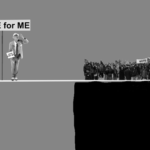The last time you and I met on this page, we kept at least one ear tuned to the Weather Channel and asked, “How could a good God allow … ?”
We closely monitored the path of Hurricane Ike as it built up strength in the Gulf of Mexico. And we asked how and why God could permit nature to wreak destruction and suffering upon such a great swath of humanity.
Meanwhile, most Americans blissfully took no notice of Hurricane Wally, which had been building up strength in the banks and brokerage firms on Wall Street. We didn’t know it was preparing to deliver a 100-year storm upon the world’s markets, threatening to blow the financial security of millions of families all to smithereens.
So, if we can consider the problem of evil and suffering in the midst of hurricane season, should we seek theological meaning in global capital catastrophe? Yea, verily.
But before we begin, a caveat or three: First, this crisis is complex. Some of the smartest people in the world don’t understand it. Second, because it is so complex, people of goodwill will take different approaches to it. Third, it couldn’t have happened at a worse time. If you can expect Washington and Wall Street to behave altruistically and responsibly during an election year, you can cast Guadeloupe Peak into the Gulf of Mexico.
Now, acknowledging I’m neither an economist nor the son of an economist, let me suggest four reasons for this unnecessary fiasco. They’re not primarily financial. And they’re not confined to Wall Street. They’re indictments on America. But they’re true reasons:
• Greed. You don’t need an Ivy League MBA to understand greed and covetousness swirl around the eye of this storm. Many fingers point to the CEOs of the giant financial corporations. But greed dominates all strata of our society. For example, the mortgage banks stoked their greed by preying upon the greed of citizens who wanted to buy more house than they could afford and who were willing to ignore risk in order to live high.
• Selfishness. A cousin to greed, selfishness seeks personal gain at the expense of others. America suffers from a pandemic of selfishness. People want their stuff, and as much stuff as they can get, and they don’t care how getting that stuff impacts others. So, market practices and financial products can be structured to benefit one at the expense of the other. And nobody thinks about ethics.
• Insensitivity. Of course, insensitivity is a byproduct of selfishness. It crassly overlooks the pain of others. It only thinks about self and family and friends, and it classifies everyone else as “other,” with less value.
Sign up for our weekly edition and get all our headlines in your inbox on Thursdays
• Sloth. This is the Bible word for laziness. And if you think it only applies to politicians and government bureaucrats, think back to the last time you voted. How well did you study the issues and cast an informed vote? This crisis illustrates how much voting matters and how vital policy is for the public good. When voters are lazy and apathetic, they usually get what they deserve.
This financial failure hit us in the pocketbook and the pension plan, but what we’ve got here is a spiritual crisis. We may want to blame Wall Street and Washington, but the financial titans, pols and government (un)regulators who brought this upon us did so with our tacit support. Collectively, America’s greed, selfishness, insensitivity and sloth enabled and empowered them.
Now, we’ll watch to see how the authorities correct the problems. But if we don’t repent of our me-first attitudes, their adjustments will account for nothing more than plastic window sheeting in the onslaught of another hurricane.
One more related word: Sit still and trust God. Great value cannot be measured by dollars. Ask God to give you calm courage and an appreciation for true value.














We seek to connect God’s story and God’s people around the world. To learn more about God’s story, click here.
Send comments and feedback to Eric Black, our editor. For comments to be published, please specify “letter to the editor.” Maximum length for publication is 300 words.